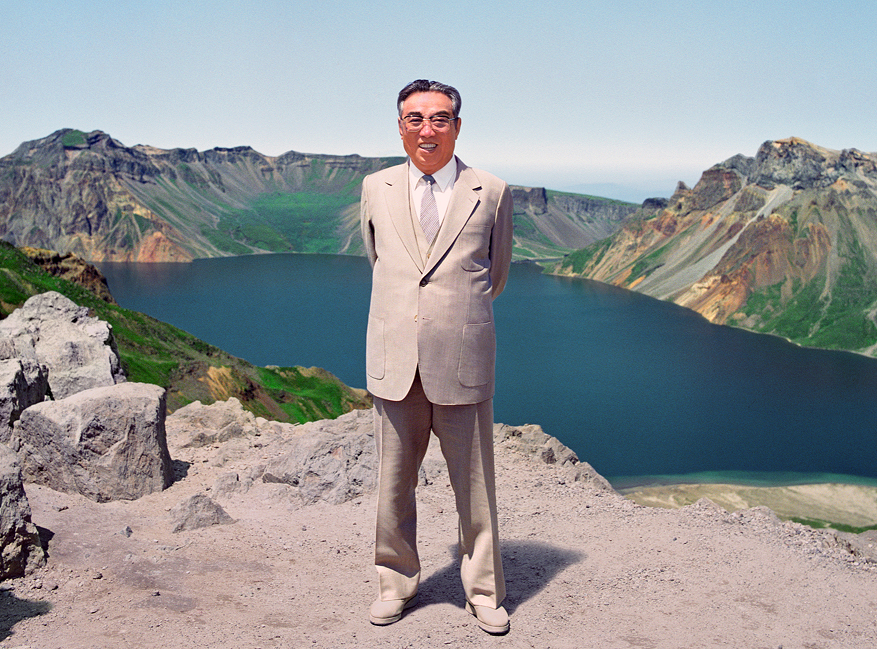
During the days of the arduous anti-Japanese armed struggle in the first half of last century when Korea was under the military occupation of Japan (1905-1945), President Kim Il Sung (1912-1994) always shared weal and woe with the people without expecting any special favour or privilege for himself.
Commander Is also a Son of the People
One day in early April, 1933, the guerilla unit led by Kim Il Sung was having a rest in front of a farmer’s house in the vicinity of Liangshuiquanzi on the shore of the Tuman River.
There was a wounded soldier in the unit. The guerrillas wanted to bring him into a warm room and knocked at the door of the house. But there was no answer.
Kim Il Sung covered the wounded soldier with his overcoat and took an axe to chop firewood.
Following him, some soldiers swept the yard and others hurried to make fire to prepare a meal.
Having never seen the guerrillas before, the host of the house and his wife had taken the guerrillas for Japanese soldiers and hid themselves inside the house. But after seeing what the guerrillas were doing, they ran out of the house.
Kim Il Sung courteously said hello to the old man, offered him a cigarette and asked about the living conditions of his family.
He asked why they, apparently old-time farmers, were not raising chickens and could not buy fur caps for their children.
The man answered that it was because they were ill-starred.
Kim Il Sung explained that it was all because of the inhuman exploitation and plunder by the Japanese imperialists and landlords that the Koreans and Chinese were living in poverty like his family, and that the only way to be well off was to fight against the Japanese imperialists.
Before leaving the house, Kim Il Sung gave some money to the old man.
It was only at that time when the old man came to know that he was General Kim Il Sung. He was surprised that the commander had chopped firewood himself.
With a smile on his face Kim Il Sung said: The commander is also a son of the people; why should I not do what others do?
Price of Potato Paid
In the second half of April 1933, the food situation in the Wangqing guerrilla zone was very difficult.
Two guerrillas who had been dispatched on a mission to obtain food had to come back with empty hands for the enemy’s control was strict. After thinking much, they went to a harvested potato field. While digging the frozen earth hoping to collect remaining potatoes, they happened to find a potato cellar.
They could not find the owner of the cellar, so they came back to the guerrilla zone each carrying a sack of potatoes.
On learning this, Kim Il Sung called the soldiers to him, and said: There is a strict rule in the guerrilla army which should never be violated in any circumstances however harsh they might be; it is the revolutionary discipline with regard to the masses of the people; how can we be called an army for the people and revolution if we lay hand on the people’s property on the excuse that our food situation is difficult; when we founded the Anti-Japanese People’s Guerrilla Army, we named it so in the sense that we should not forget the people even a moment, and put forward the revolutionary slogan “As fish cannot live without water, so the guerrillas cannot live without the people”; we should never put our hands on the property of the people even though we should die of hunger and cold; this is the strict rule of the guerrilla army which is made up of the sons and daughters of the people and fights for the interests of the people.
As they were remorseful for what they had done, Kim Il Sung told them to find the owner of the potato cellar, apologize to him and generously pay him for the potatoes.
It took them a long time to find the owner. They apologized to him and offered him a liberal amount of money for the potatoes even though he declined.
Price of an Axe Paid
It happened when the anti-Japanese guerrilla army was staying for several days in a village called Liangshuiquanzi on the shore of the Tuman River.
Kim Il Sung stayed in the house of an old Chinese man. Every morning he would wake up earlier than the host and hostess, clean the house inside and outside, go to the Tuman and bring water from the hole he made on the frozen river.
One early morning he went to the river to fetch water. It was a very cold day and the water hole was frozen hard. When he had nearly finished making a hole in the ice, the head of the axe slipped from the handle and fell into the hole.
He raked about for hours with a long pole with hooked prongs on its end, but it was in vain because the river was so deep. Though it had happened while he was doing the host a favour, he did not give up his search.
His soldiers told him that it would do if they paid the host for the axe.
Kim Il Sung said to them that no amount of money would be able to make up for the host’s loss of his cherished tool. He continued to search for the axe, but he could not find it.
Having nothing else to do, he generously paid the host for the axe and apologized to him again.
In May 1959, he asked a group of visitors to the battlefields of the anti-Japanese armed struggle in northeast China to find the whereabouts of the old man and apologize once again in his place.








